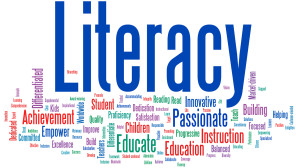[fusion_builder_container hundred_percent=”yes” overflow=”visible”][fusion_builder_row][fusion_builder_column type=”1_1″ background_position=”left top” background_color=”” border_size=”” border_color=”” border_style=”solid” spacing=”yes” background_image=”” background_repeat=”no-repeat” padding=”” margin_top=”0px” margin_bottom=”0px” class=”” id=”” animation_type=”” animation_speed=”0.3″ animation_direction=”left” hide_on_mobile=”no” center_content=”no” min_height=”none”]
I believe the author Stephen King would hate the language of the Common Core State Standards for one reason: unnecessary adverbs. His book On Writing has a section devoted to explaining why The adverb is not your friend.
Adverbs … are words that modify verbs, adjectives, or other adverbs. They’re the ones that usually end in -ly. Adverbs, like the passive voice, seem to have been created with the timid writer in mind. … With adverbs, the writer usually tells us he or she is afraid he/she isn’t expressing himself/herself clearly, that he or she is not getting the point or the picture across.
I have written about King and adverbs before. As I am implementing the standards in my high school English curriculums, I find myself agreeing with him. Take, for example, the Common Core Anchor Reading Standard 1. The standard states:
Read closely to determine what the text says explicitly and to make logical inferences from it; cite specific textual evidence when writing or speaking to support conclusions drawn from the text. CCSS.ELA-LITERACY.CCRA.R.1
The use of adverbs in this standard has led to more confusion, not less. The expression “read closely” was recoined as “close reading,” and that has resulted in parodies of teachers holding books up to their faces, mocking the standard. Why the writers of the Common Core felt the need to modify the action verb “read” at all is perplexing. Students must read to determine what a text says. That is all. The admonishment to “read closely” to determine what the “text says explicitly” infers the author is either trying to slip an idea past a reader or the author has been ineffective in communicating the idea. I am not convinced any author would appreciate this standard.
Moreover, the Common Core Anchor Writing Standards have the same problem, for example,
Write informative/explanatory texts to examine and convey complex ideas and information clearly and accurately through the effective selection, organization, and analysis of content. CCSS.ELA-LITERACY.CCRA.W.2
I believe that every teacher requires students to convey “complex ideas and information clearly and accurately,” yet the language of this standard infers that students would be allowed to write distorted or inaccurate responses. The standard should read, “Write informative/explanatory texts to examine and convey complex ideas and information through the effective selection, organization, and analysis of content.” The adverbs are redundant, as King demonstrates in On Writing: (bolded words his choice)
Consider the sentence He closed the door firmly. It’s by no means a terrible sentence (at least it’s got an active verb going for it), but ask yourself if firmly really has to be there. You can argue that it expresses a degree of difference between He closed the door and He slammed the door, and you’ll get no argument from me … but what about context? What about all the enlightening (not to say emotionally moving) prose which came before He closed the door firmly? Shouldn’t this tell us how he closed the door? And if the foregoing prose doestell us, isn’t firmly an extra word? Isn’t it redundant?
The same editing should be applied to the Speaking and Listening Anchor Standards:
Prepare for and participate effectively in a range of conversations and collaborations with diverse partners, building on others’ ideas and expressing their own clearly and persuasively. CCSS.ELA-LITERACY.CCRA.SL.1
In this standard, the subjective nature of the adverb “effectively” creates the same confusion as reading “closely.” This standard could be made measurable if the emphasis was on the infinitive “to persuade” rather than on the timid adverbs “effectively” and “persuasively.” How does one measure these terms, unless by degrees? An argument is either effective or not. Readers are persuaded or not. A standard is unequivocal. The present wording could lead to much equivocating if a reader has to determine the degree of “effectively” or “persuasively.” Try this rewrite: Prepare for and participate in a range of conversations and collaborations with diverse partners, building on others’ ideas in order to persuade.”
In addition, the Language (or grammar standards) themselves contain a distracting adverbial phrase:
Apply knowledge of language to understand how language functions in different contexts, to make effective choices for meaning or style, and to comprehendmore fully when reading or listening.CCSS.ELA-LITERACY.CCRA.L.3
The phrase comprehend”more fully” sounds like a phrase from one of my student’s essays. I would equate the construct of “more fully” with “as a whole” or “the fact that” or the ubiquitous word “flows” found in my weaker writers’ responses. These are all phrases that receive a largeNO! in red ink from me as I grade or confer. A reader comprehends or a reader does not.
King argues that writers must be deliberate in stemming adverbs in this selection from On Writing:
Someone out there is now accusing me of being tiresome and anal-retentive. I deny it. I believe the road to hell is paved with adverbs, and I will shout it from the rooftops. To put it another way, they’re like dandelions. If you have one on your lawn, it looks pretty and unique. If you fail to root it out, however, you find five the next day . . . fifty the day after that . . . and then, my brothers and sisters, your lawn is totally, completely, and profligately covered with dandelions. By then you see them for the weeds they really are, but by then it’s — GASP!! — too late.
King is proved correct about the propagation of adverbs in the language of the Common Core. Adverbs pop up in the NOTES ON sections that follow the anchor standards. For example:
Notes on Range and Content of Student Reading
Students can only gain this foundation when the curriculum is intentionally andcoherently structured to develop rich content knowledge within and across grades. Students also acquire the habits of reading independently and closely, which are essential to their future success.
Notes on Range and Content of Student Speaking and Listening
Digital texts confront students with the potential for continually updated content and dynamically changing combinations of words, graphics, images, hyperlinks, and embedded video and audio.
When a reader removes the bolded words, the pedantic tone disappears. The implications that curriculum is “unintentional” or “unstructured” is removed. The confusion as to what reading “closely” means is removed. Don’t even get me started as to why “dynamically” is there, although I suspect the use is to suggest there may be some form of cool media out there that does not yet exist so the CCSS writers modified the adjective “changing” on combination with “dynamically” to cover future media constructs. The only adverb in this section that needs to be included is “independently,” and that should be an adjective. We all want independent readers, so be clear and say “independent readers.”
Stephen King has had an impact on my writing, and when I come to including an adverb I pause to think if that adverb is necessary. Would that the writers of the Common Core felt the same. The standards are riddled with adverbs. How did I find most of them? I used the “Find” option (command-F on my Mac) and put “LY” in the search box.
Consider how the advice from King can be used by teachers in stopping the flood of adverbs and in applying the Speaking and Listening standard in a classroom where ”Digital texts confront students with the potential for updated content and changing combinations of words”….. NOTE: continually and dynamically not included.[/fusion_builder_column][/fusion_builder_row][/fusion_builder_container]



